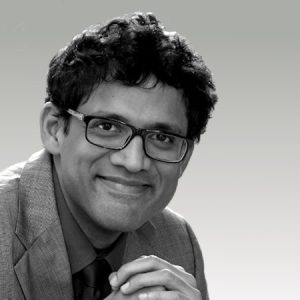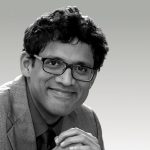
Raj Raghunathan
Guest is known for...
Raj Raghunathan is a Marketing professor at The University of Texas who uses psychology, behavioral science, decision theory and marketing to explain consumer behavior. His research focuses on how people’s judgments and decisions impact their own happiness and fulfillment. Raghunathan is known for his online course on happiness and his book “If You’re So Smart, Why Aren’t You Happy?”
Here's what I will learn...
In our conversation, he speaks about his journey to researching happiness and his take on why so many people around us who are smart and successful but not necessarily happy. He talks about some common pitfalls people get into and some perspectives on how we can prioritise (not necessarily pursue happiness) in our lives.
LISTEN TO THE FULL CONVERSATION
From the Podcast
Raj speaks about his journey to becoming a researcher of happiness. He speaks about how he thought about his journey after graduating from IIM Calcutta and how he came to the US. He also speaks about how he started out with a deep interest in marketing but has gravitated towards teaching happiness over a period of time.
Raj defines happiness and speaks about the common misconceptions people end up having around happiness. He speaks about the nuances around prioritizing (rather than pursuing) happiness and how one could walk that tightrope.
Raj speaks about the link between levels of success and happiness. He goes on to speak about the relationship between happiness and education levels. He mentions that happiness rises till the undergraduate level but not necessarily post that, suggesting that the commercial threshold for us to be really happy is much lower than what we might think it is.
Raj makes the connection between our mindsets (scarcity versus abundance) and our levels of happiness. He mentions that more than the amount of money we have, our relationship with the money we have is a better indication of our happiness levels.
Raj speaks about the link between time affluence and an abundance mindset, two seemingly uncorrelated concepts. He also goes onto talk about the link between how much we load our plates and the link between that and happiness. He also shares some insights around how we can bring in some time affluence in our lives.
Raj speaks about the habit of medium maximization (we forget the goals but start focusing on the means instead). He speaks about the paradox here and talks about how it shows up in the suboptimality in the way we make choices including critical ones such as choosing between jobs/career pathways.
Raj speaks about the valley of mid-life and how we can try to bring greater happiness by either job-crafting (look for adjacent spaces around what we do currently in our company), pursuing a vocation on the side that energizes us that could one day possibly become a profession and pick up a hobby or two that could give us a sense of meaning and bring happiness that we could take back to our work.
Raj speaks about how we could reframe the way we look at negative outcomes. He speaks about the phenomenon where we end up having an intense negative feeling around an undesired outcome but often the intensity wears down over time. He suggests a “reminisce and reflect” exercise that could help us see things in perspective.
Raj speaks about the notion of pursuing flow rather than chasing superiority as we think about making key choices in our journey. He also speaks different kinds of flow and goes onto speak about the importance of mastery in us experiencing high flow (harder to achieve at the foothills of a pursuit).
Raj speaks about his thoughts around raising happy children and how parents need to walk the tightrope across discipline and love. He makes the case for leaning into love given a choice and speaks about the framework developed by Baum Rind who has studied this in detail.
